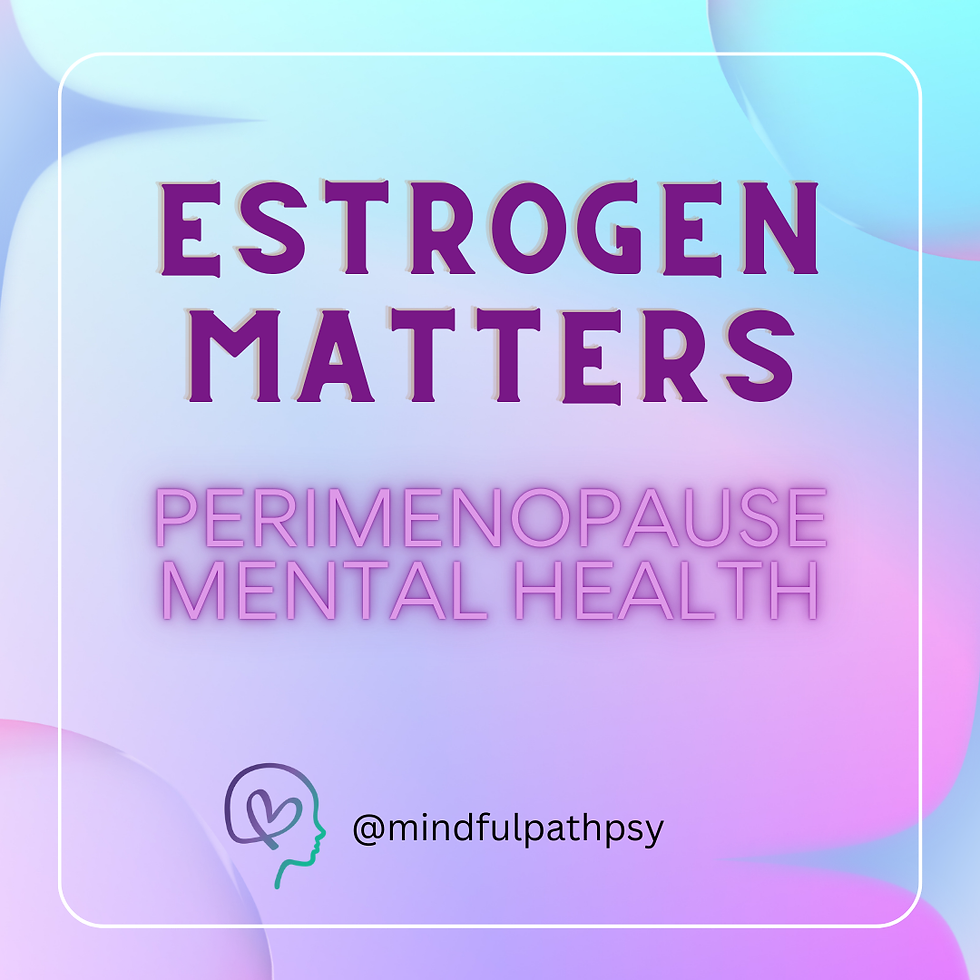Why Does Perimenopause Make Me Feel Antisocial?
- drtera

- Oct 6, 2025
- 5 min read
Have you recently found yourself declining invitations, withdrawing when you used to be the one keeping everyone laughing, or feeling emotionally “on edge” around people who used to feel easy? You're not alone, it might be a peri symptom and there’s real science behind why perimenopause can stir up social fatigue, sensitivity, or even a desire to hide under the covers. Let me walk you through some of what is known (and still emerging) about your hormones, the brain, and the heart during perimenopause.

The Hormonal Rollercoaster: More Than Just Mood Swings
Perimenopause is, by definition, a time of upheaval in the reproductive hormone world. Your ovaries are producing less predictably, and levels of estrogen, progesterone, and testosterone fluctuate (often widely) before eventually settling at lower levels. PMC+2PMC+2
It’s not just how much of each critical hormone you have that matters, but how wildly they shift. That volatility is a major culprit in many of the changes you might be experiencing and why you feel like you are on a literal emotional roller coaster. Below are a few of the ways hormonal change can push you toward social withdrawal or emotional sensitivity.
Estrogen Fluctuations & Sensitivity to Social Stress
Estrogen (particularly estradiol) is deeply involved in regulating neurotransmitters such as serotonin, dopamine, and GABA—and those systems influence mood, anxiety, reward, and social engagement. PMC+3SAGE Journals+3PMC+3
When estrogen levels jump or drop sharply, your brain’s balance shifts. In fact, a study of women in the menopausal transition found that greater week-to-week fluctuations in estradiol predicted greater anxiety symptoms and lower pleasure (anhedonia), which is also a key symptom of depression. ScienceDirect
And there’s a particularly interesting wrinkle: in one study, those fluctuations also predicted rejection sensitivity—feeling more hurt or reactive when social cues feel ambiguous or negative. PMC+1
In other words, when estrogen is unstable, you might be more likely to read every glance or comment as judgment, criticism, or distance—even when no one meant it that way. If you are reading things this way, it is natural and protective to want to avoid or withdraw from such a negative experience.
Progesterone, Withdrawal, and Social Motivation
Progesterone (and its metabolites) plays a calming role in many brain circuits, especially via GABA (the “braking” neurotransmitter). But in perimenopause, there can be irregular or low progesterone production (because ovulation becomes erratic). ScienceDirect+3Frontiers+3PMC+3
Animal and human studies both suggest that a reduction in progesterone (or its derivative neurosteroids) can lead to lower motivation, increased emotional reactivity, and social avoidance behaviors in susceptible individuals. Nature
So when progesterone dips or is inconsistent, the modulatory “dampener” effect may weaken, making your emotional baseline more reactive, aka sensitive.
Testosterone, Ratios, and Mood
Testosterone is often overlooked in discussions of perimenopause, but it shifts during this transition too, sometimes subtly, sometimes more markedly. Some studies suggest that as estrogen declines, the ratio of testosterone to estrogen becomes important: a relatively higher testosterone-to-estrogen ratio was associated with more depressive symptoms. BioMed Central
Furthermore, in a pilot study, adding transdermal testosterone in peri- or post-menopausal women was associated with improvements in mood and cognitive symptoms over about 4 months. SpringerLink
So changes in androgens may also subtly influence how your mood and energy respond to the hormonal firestorm.
How All This Becomes “Antisocial”—A Deeper Look
Putting together what the research suggests, here are ways perimenopausal hormonal shifts can push you toward retreat:
Emotional hypersensitivity — Because your brain is more reactive to social cues (especially ambiguous ones), tiny perceived slights or neutral expressions may feel magnified.
Increased anxiety and vigilance — You may be more on edge, worried about how you’re coming across, or second-guessing your interactions.
Lower social reward — Activities and gatherings you once enjoyed may feel draining rather than energizing, especially on “off” hormonal days.
Fluctuating energy & internal noise — When your internal baseline is shifting, it takes extra effort to show up emotionally. You may feel internally tumultuous and prefer inner space to social performance.
People-pleasing strain — If you’ve long been a caretaker or someone who thrives on connecting, the drag of emotional reactivity can make maintaining that role feel exhausting or impossible some days.
It’s not that there’s something “wrong” with you. It’s that your inner wiring is being remodeled—and it’s okay to need new strategies.
What Helps When You Feel Like Retreating
When you find yourself recoiling from social life, here are some supportive practices:
Mindful awareness trackingNotice your cycles of peaks and crashes. Track when you feel socially “off” and whether they correlate with physical symptoms or mood shifts.
Permission + boundariesLet yourself say “no” without guilt. You don’t have to perform emotionally every day.
Micro-connectionsIf big gatherings feel heavy, lean into shorter, more intentional interactions—coffee with one friend, a walk, a quiet shared activity.
Somatic regulation practicesGrounding, breathing, gentle movement help calm the nervous system so that even when hormones challenge you, you have tools to settle.
Therapeutic supportYou don’t need to navigate this alone. Whether in individual therapy or group support, having a guide who knows perimenopause can make all the difference.
I Get It—Because I’m In It Too
I’m Dr. Tera, a psychologist and a woman in perimenopause myself. I, too, feel the tug when I’m social, the temptation to retreat, the emotional sensitivity when hormones shift. I created therapy spaces, both one-on-one and in groups—for exactly this season of life: where we can validate, map, strategize, and grow in this next chapter together.
If you feel like you’re isolating more than you want, or you're struggling to connect even when you want to, I’d be honored to walk alongside you. Reach out, and we’ll find the right space for you—whether it’s individual therapy or a small group of women navigating perimenopause together. You don’t have to feel alone in this.
References
Albert, K., Pruessner, J., & Newhouse, P. (2015). Estradiol levels modulate brain activity and negative affect in women with perimenopausal depression. Translational Psychiatry, 5(1), e562. https://doi.org/10.1038/tp.2014.133
Barth, C., Villringer, A., & Sacher, J. (2015). Sex hormones affect neurotransmitters and shape the adult female brain during hormonal transition periods. Frontiers in Neuroscience, 9, 37. https://doi.org/10.3389/fnins.2015.00037
Freeman, E. W., Sammel, M. D., Lin, H., & Nelson, D. B. (2016). Associations of hormones and menopausal status with depressed mood in women with no history of depression. Archives of General Psychiatry, 63(4), 375–382. https://doi.org/10.1001/archpsyc.63.4.375
Garza, L. A., Irwin, S. L., & Guay, A. T. (2024). Effects of testosterone therapy on mood and cognition in perimenopausal and postmenopausal women: A pilot study. Archives of Women's Mental Health, 27(2), 213–222. https://doi.org/10.1007/s00737-024-01513-6
Gordon, J. L., Eisenlohr-Moul, T. A., Rubinow, D. R., & Schmidt, P. J. (2022). Estradiol fluctuation, sensitivity to social rejection, and mood in the menopause transition. Psychoneuroendocrinology, 138, 105694. https://doi.org/10.1016/j.psyneuen.2022.105694
Lovick, T. A., & Guapo, V. G. S. (2019). Progesterone, neurosteroids and the regulation of the GABAergic system in anxiety and stress. Frontiers in Psychology, 10, 1319. https://doi.org/10.3389/fpsyg.2019.01319
Yildiz, B. O., Bolu, E., & Akin, F. (2021). The relationship between sex hormones and mood symptoms in perimenopausal women. Biology of Sex Differences, 12(1), 45. https://doi.org/10.1186/s13293-021-00388-x
Zhao, Y., Wang, S., & Girdler, S. S. (2022). Progesterone withdrawal, allopregnanolone, and social avoidance behavior: A translational review. Translational Psychiatry, 12, 347. https://doi.org/10.1038/s41398-022-02294-1




Comments